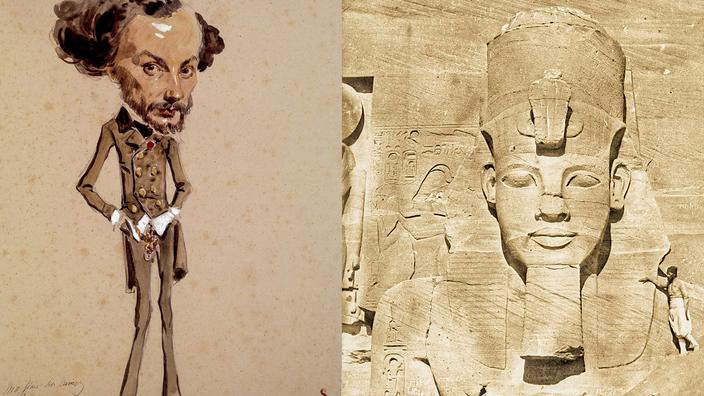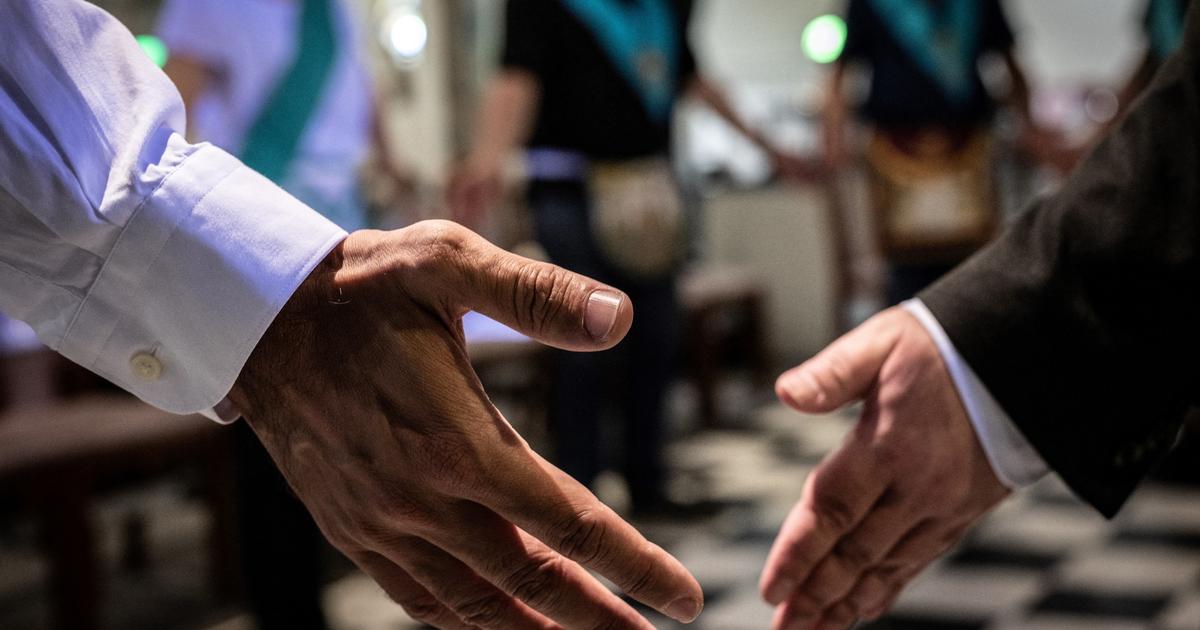Portrait of Signora Morrocchi by Antonio Puccinelli, 1859 AKG Images / De Agostini Picture Lib./G.Nimatallah
December 7, 1849. When he saw the pyramids in the distance, Flaubert launched his horse at a gallop.
Maxime Du Camp follows him.
Arrived in front of the Sphinx, they tumble from their mount and contemplate, amazed, the colossus who seems to look at them with an air that terrifies them.
Max has turned all white.
Gustave has opened his mouth, but he is unable to utter the slightest sound.
His head is spinning.
Fascinated, they let themselves fall on the sand and light a pipe.
To read also: Michel De Jaeghere: "Madame Bovary, c'est nous"
Having left Paris at the end of October, the two friends embarked in Marseille and arrived in Egypt on November 15.
In Alexandria, they stayed at the Hôtel d'Orient to explore the region.
Their plan is to then go up the Nile to Nubia, then go down again, visiting all the antiquities before reaching Beirut, Palestine then Persia.
Du Camp took care of all the stewardship and even landed two vague missions on behalf of the government of the Second Republic.
Mrs Flaubert financed the trip, to which she only reluctantly consented, fearing for her son a relapse of his nervous illness.
“He surrenders to the fascination exerted on him by the monster of Giza while the Arabs pitch their tent.
"
Irina de Chikoff
Gustave himself, at the last moment, was tempted to give up.
Not only was he afraid of never seeing his "
poor old darling
" again, but he was still in a violent disillusionment.
When he read La Tentation de saint Antoine to Louis Bouilhet and Maxime, the verdict was final: unpublishable!
Every time he thinks about it, Flaubert wants to cry.
Why live if he has to give up writing?
But facing the Sphinx, Gustave no longer thinks of Saint Anthony or of his own future.
He abandons himself to the fascination exerted on him by the monster of Giza while the Arabs pitch their tent.
The next day, Gustave and Maxime set out to climb the pyramid of Kheops.
We pull them, we push them, we hoist them.
Panting, they watch the sun rise over the desert.
Their hearts are beating fast.
Too fast.
They will spend three nights at the foot of the pyramids before returning to Cairo where they rent a cange, a long boat with sail and gaffs, with ten sailors.
Along the river, which they go up to Abu Simbel, they hunt, even shoot crocodiles, but "
scoundrels die hard
";
they eat date jams, figs, oranges, weather a sandstorm, cross violent rapids, let their beards grow, laugh when monks throw themselves into the water to beg for money while the sailors show behind and chase them away with sticks.
Read also: Gustave Flaubert, the fury to write: the memories of a crazy game
Back in Cairo, Gustave is tired of temples and pyramids.
He has had enough and devotes himself, in addition to some inevitable social events, to discussions with representatives of various religions as well as to frequenting prostitutes.
In his letters to Louis Bouilhet, he praises his performances, in particular in the baths with a "
young fellow (…) who had an enormous white turban
".
On the other hand, he keeps to himself the night he spent in Esneh with a famous courtesan, Kuchuk-Hanem.
They loved each other, at least Flaubert wants to believe it.
On July 17, 1850, they set sail for Beirut and fell in love with the Lebanon chain with its villages, cedars and umbrella pines.
From there they set off with a large crew for Jerusalem.
Along the way, they visit Tire, Sidon, Mount Carmel, Saint-Jean-d'Acre, Jaffa and Ramleh.
Not only does the Holy City disappoint Flaubert, but this “
mass grave surrounded by walls
” infuriates him.
The members of the Armenian, Greek and Coptic churches never stop cursing each other, cursing each other.
Disgusted, Gustave blasphemes in his turn: "
of holiness, go fuck yourself
."
To console himself, he rereads the discourse on the mountain in the Gospel of Saint Matthew.
In Bethlehem, he finally finds something "
beautiful, [of] true
".
Then they resume their journey to Damascus and Tripoli, sleeping under the trees or under the stars.
They decided to give up Persia, because their purse is now empty, to join Constantinople where they landed in November 1850. There, between a visit to Hagia Sophia, a foray into the slave market, they honor at Antonia of the ladies Greek and Armenian.
Gustave wonders: why not live with an odalisque?
Why not lead the life of a pasha?
Hasn't he already taken on the majestic appearance, the plumpness and the custom of eating with his hands?
Only one thing holds him back: he would hate someone to come and kiss his palm, lick it while feigning ecstasy!
This article is from the
Figaro Hors-Série:
Flaubert, la fureur d'être
.
Discover Flaubert's eventful life, his friendships, his work, his characters, his quest for the perfect style on
Figaro Store
.
Portrait of Signora Morrocchi by Antonio Puccinelli, 1859. AKG Images / De Agostini Picture Lib./G.Nimatallah









